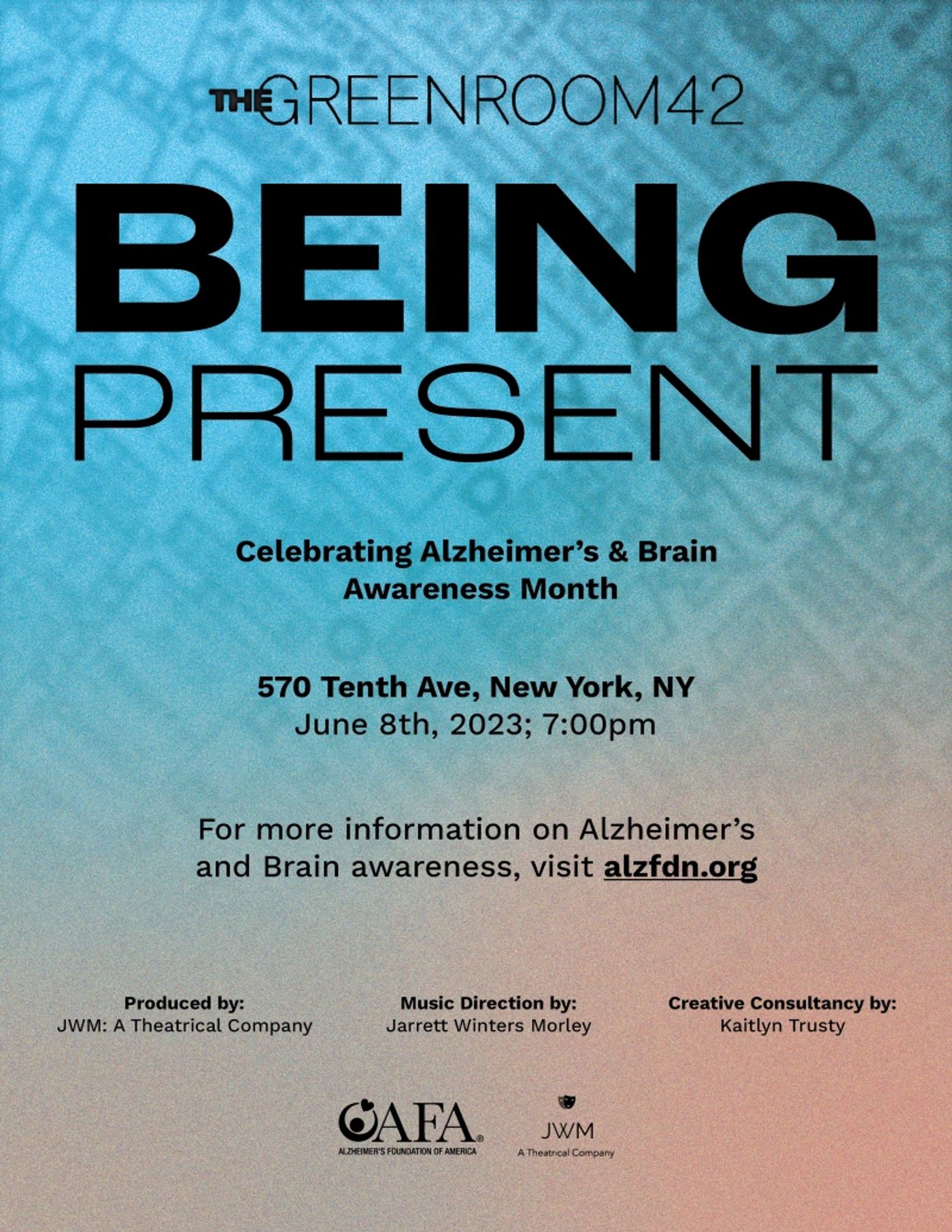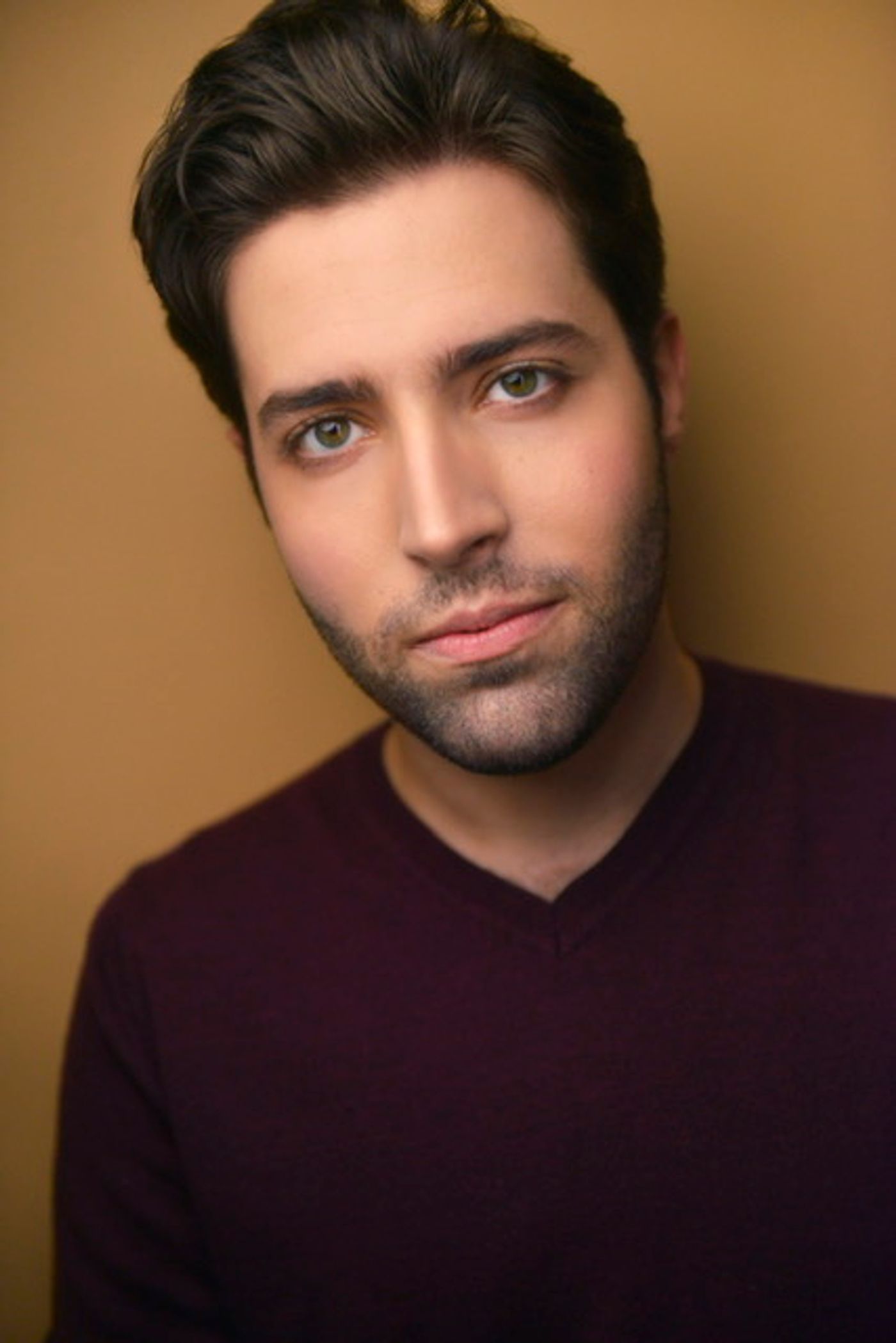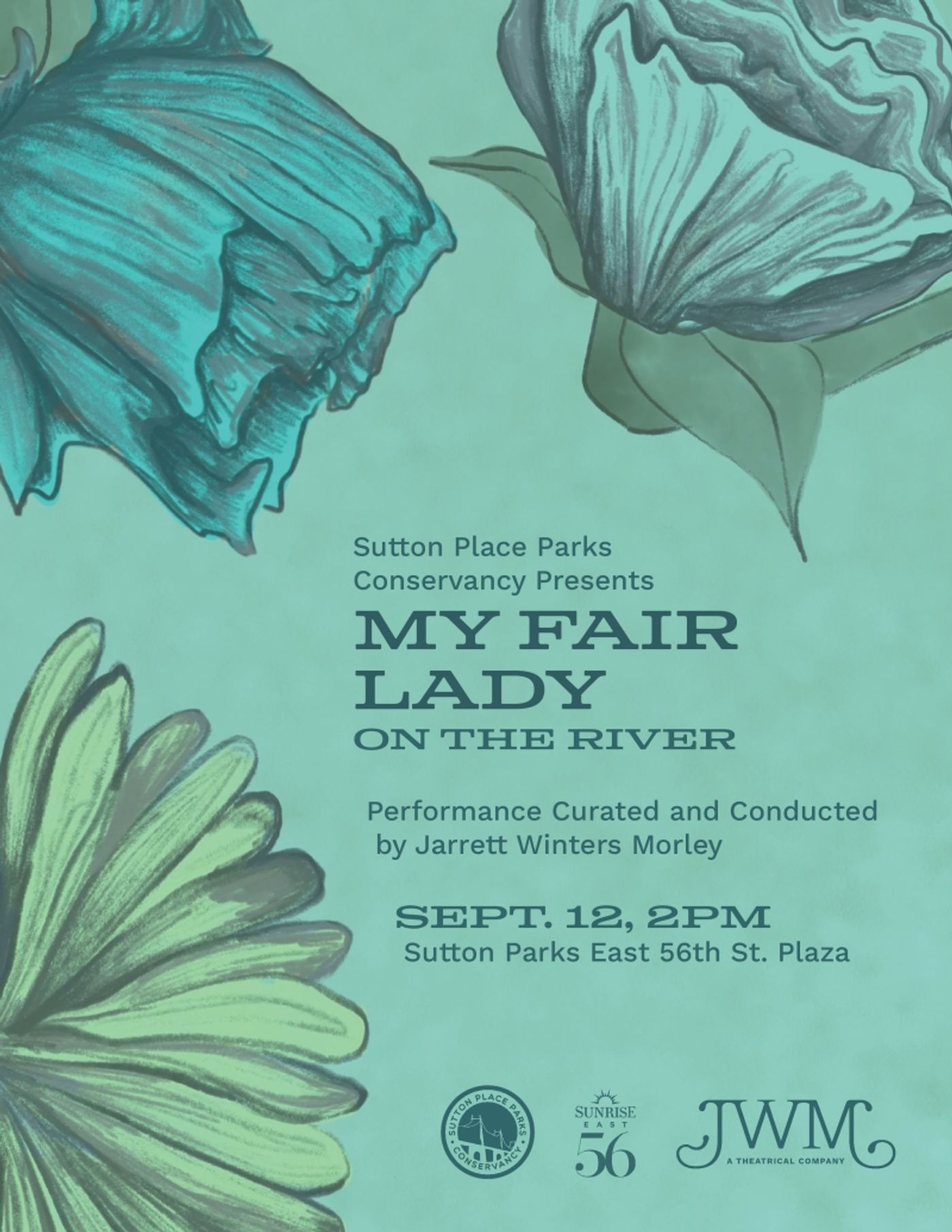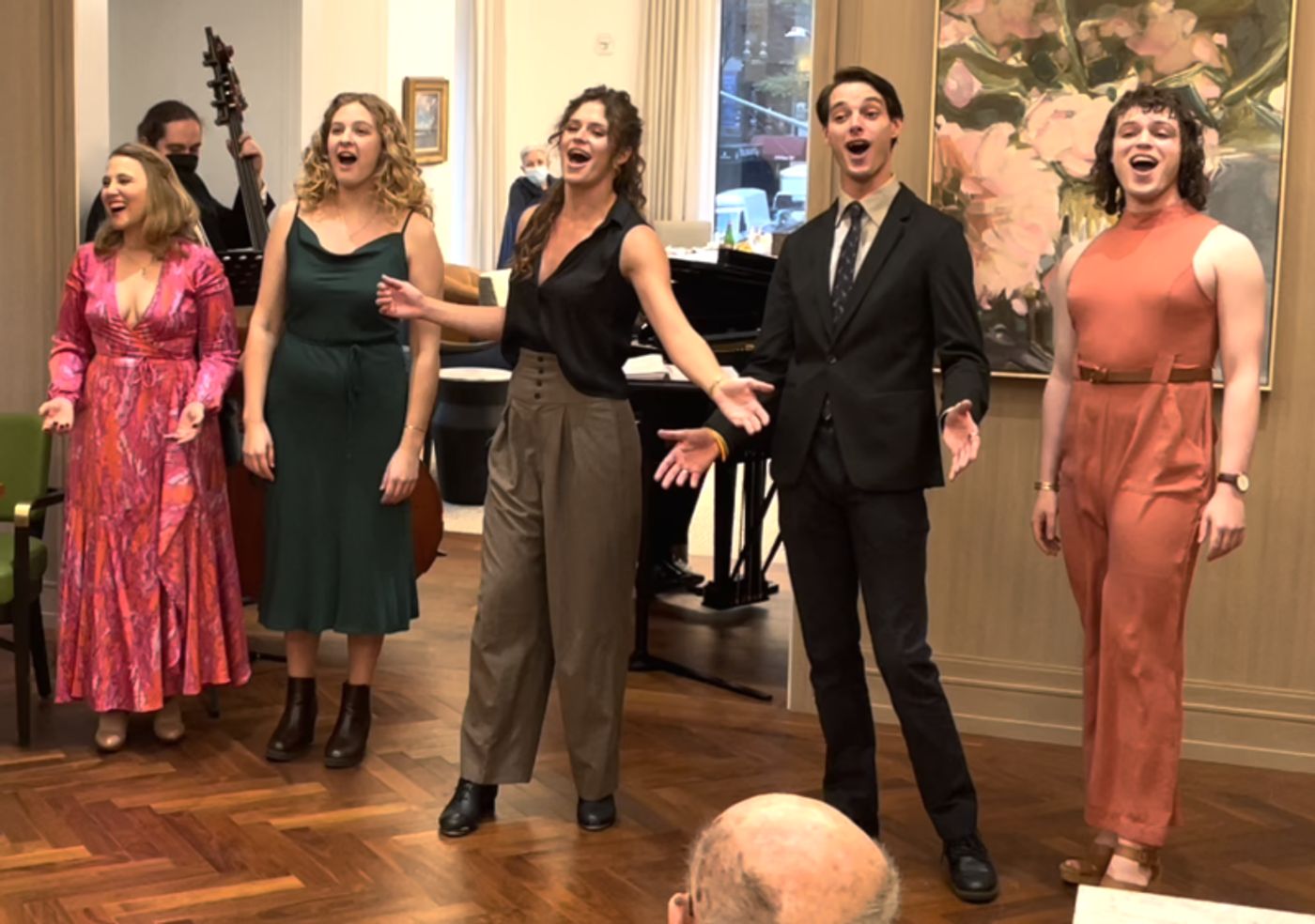Interview: Jarrett Winters Morley of BEING PRESENT: CELEBRATING ALZHEIMER'S & BRAIN AWARENESS MONTH at The Green Room 42
"Broadway would not be what it is today without the past."

Alzheimer's and dementia are diseases that touch the citizens of the world in unhappy ways every day, with many families being affected by the ailments. Fine organizations like The Alzheimer's Foundation of America work, tirelessly, to provide resources and assistance for patients and families in need, but it is not, only, the big institutions with a focus on bringing aid to these members of society facing difficult times. Sometimes the outstretched hand of help comes from just one person.
Jarrett Winters Morley is just such a person.
Jarrett Winters Morley is an actor, a singer, a dancer, a writer, a musician, a composer, a lyricist - like many people working in show business, Jarrett Winters Morley has had to learn to be a storytelling Jack of All Trades, plying his craft and artistic pursuits in many different directions. Fortunately, Jarrett Winters Morley has a great many talents and, to go with them, passion for each and every one of those talents. On June 8th, when The Green Room 42 presents Being Present: Celebrating Alzheimer's and Brain Awareness Month, Jarrett Winters Morley will be in the Director's chair, wearing his Producer's hat, and leading the way with his Musical Director's Baton. The evening that Jarrett Winters Morley has planned shines a light on the power of music to heal, to revive memories, and to inspire joy. With a focus on the genre of musical theater (Jarrett's favorite), the musical cabaret is being created with the participation of The Alzheimer's Foundation of America, with whom Jarrett Winters Morley is working to further their shared cause.
As rehearsals for the June 8th, 7 pm show bring the cast and creatives closer to the performance date, Jarrett took a few minutes out of a busy day to talk with Broadway World Cabaret about the production, about his ongoing work with patients living with Alzheimer's and dementia, and about the power of musical theater to enrich lives.
This interview has been edited for space and content.
Jarrett Winters Morley, welcome to Broadway World.
Thank you very much. It's a pleasure to be here.
Jarrett, you are producing and directing an upcoming show at The Green Room 42 titled Being Present: Celebrating Alzheimer's and Brain Awareness Month. Is this a show that you created from the ground up or did the Alzheimer's Foundation of America come to you with the idea?
 This is a show I created from the ground up, which, if you think of it in its full conception, actually began a year ago because one of the things I do is I go around the city and I give lectures about the history of musicals. Each week we'll come in and focus on a different musical, and, with one of my clients, we were talking about Rodgers and Hammerstein's Carousel, a critical cornerstone when it comes to musical theater structure and storytelling. While I was talking about the show, I thought it might be nice to have a live performance of it. So I gathered a couple of singers and a pianist, and my clients are typically in the older age range, and sometimes they suffer from various ailments, whether it's dementia, Alzheimer's...
This is a show I created from the ground up, which, if you think of it in its full conception, actually began a year ago because one of the things I do is I go around the city and I give lectures about the history of musicals. Each week we'll come in and focus on a different musical, and, with one of my clients, we were talking about Rodgers and Hammerstein's Carousel, a critical cornerstone when it comes to musical theater structure and storytelling. While I was talking about the show, I thought it might be nice to have a live performance of it. So I gathered a couple of singers and a pianist, and my clients are typically in the older age range, and sometimes they suffer from various ailments, whether it's dementia, Alzheimer's...
and when we brought this performance in last May, there was one woman who never participated, never spoke (she had Alzheimer's and dementia) but when we brought this music in, she knew every single word and was mouthing along to every single thing. Fast forward to November, we did a smaller iteration of our June show, in which I gathered five vocalists and music spanning from the 1940s all the way through the 21st century, and focused on the idea of bringing music to these individuals that they would essentially recognize. That's what we had happen. We had an audience of maybe 30 people, age range 60 to, I think our oldest was 97, and you could see the glint in their eyes when they recognized music, when they were mouthing along. So I went to the Alzheimer's Foundation of America and said, "Hey, we did this smaller concert in November for a private client that was really successful - it's something I would love to bring to the public and to the wider community, something I'd love to be able to share with people that you work with as well." They loved the idea. That's where we are now.
Do you have a personal reason for your dedication to the cause? Or is your interest purely based on the empathy that you have, given these concerts that you've already done?
 I think it stems from when I started my lecture series, which would've been about 18 months ago, at this point, because many of my clients are in that older age range. Every time I bring in these shows, I love to do these lectures as sort of a q & a, making sure the people listening to it and watching it are involved: they share their own stories of what it was like to be at the opening night of Carousel, or I have clients who were in the original cast of West Side Story, and hearing them share those stories and having other clients listen to these stories in the same room made me think, "What else can I do to bring this sense of nostalgia, this sense of live entertainment to those communities?" These are also individuals who, because of age or ailment, might not be able to access the theater anymore, let alone a 7:30 o'clock show. That's probably the biggest reason why we're doing this - because what it does is provide entertainment to those who can no longer physically access the theater, whether it's because of age or ailments The show we have coming up in September - we're doing My Fair Lady on the River with the 27 Piece Orchestra. We're doing it in the middle of the day because that's when they're able to attend and experience what they can't, normally, at night in a Broadway venue.
I think it stems from when I started my lecture series, which would've been about 18 months ago, at this point, because many of my clients are in that older age range. Every time I bring in these shows, I love to do these lectures as sort of a q & a, making sure the people listening to it and watching it are involved: they share their own stories of what it was like to be at the opening night of Carousel, or I have clients who were in the original cast of West Side Story, and hearing them share those stories and having other clients listen to these stories in the same room made me think, "What else can I do to bring this sense of nostalgia, this sense of live entertainment to those communities?" These are also individuals who, because of age or ailment, might not be able to access the theater anymore, let alone a 7:30 o'clock show. That's probably the biggest reason why we're doing this - because what it does is provide entertainment to those who can no longer physically access the theater, whether it's because of age or ailments The show we have coming up in September - we're doing My Fair Lady on the River with the 27 Piece Orchestra. We're doing it in the middle of the day because that's when they're able to attend and experience what they can't, normally, at night in a Broadway venue.
Is this why you started doing your lecture series?
I started it in the middle of the pandemic: December, 2020. I'm at home preparing my master's degree and our industry was shut down and it was unbearable to watch and witness, not knowing when everything was coming back. Like everyone else in the world, they were trying to figure out, "What do I do for work? How do I be sort of cynical for a moment: How do I make money?" And I've always been one who's like: whatever I do, I want it to be something that I love. I love musical theater more than anything. I also have a love for history. And when I was in college, one of my favorite professors, David Loud, taught a history of musical theater course. And I thought, "What if I tried doing that but broke it down for each client, and focused on a show and it wouldn't just be about the book, music, and lyrics, you would go into the conception behind it, the impact it had on the industry, all these niche stories that nobody knows about. So I created a test class and brought it to a local business that was in the area where I live, and they loved it. From there it just kind of grew, and that's where all of these different ideas sort of branched out from, the outdoor concerts for accessibility, the Being Present concert - I think a lot of it did start from that lecture series.
You have a lot of work that you do, you act and you write and you musical direct, and now you do these lecture series and you're a cabaret producer...
I started my entire career as a performer, actor, singer, dancer. I've always had an interest in composing and writing - that's something I started doing my senior year of college - I wrote and produced my first musical, Morningside, and I will never forget, after our first preview, Randy Graff, who was a college professor of mine, came up to me, as I was sitting in the orchestra, cause I was also the conductor for the orchestra, and she said, "Look, you made a hat where there never was a hat." And that sort of validation, knowing that what you're doing, you are good at it, and you can continue to do this, was the drive to start doing so many of these other things, as well. I'm very lucky that everything I do is involved in this industry, whether it's performing, writing, producing. One of the biggest reasons I segued more into producing and writing, as opposed to performing, is because, right before Covid, all the way up through last year, I had my own physical ailment, illnesses and health problems that I was overcoming, which cumulated with a complete left hip replacement last August. During all that time of not being able to dance, not being able to audition, I didn't want to just sit back and do nothing. I started to focus and hone on my other strengths, as well, and now I've got all of these different facets, and I'm very lucky to have a support system who has always been in my corner. I'm very lucky to be surrounded by people where, if I don't know something, I can go to and say "Can you help me?" - the best way to move forward is by surrounding yourself with people who know more than you do.
How will you balance out the entertainment part of your show with the serious subject that you are presenting?
The first thing we're doing is having the CEO of the Alzheimer's Foundation of America come up to the stage at the beginning of the show and talk about the resources they have, but also what strength music has, within this whole field. When it comes to Alzheimer's, music does really have the strength to help people focus or bring back certain memories, and the way we're balancing all of this out is that, aside from the hopeful recognition of the music, I'm gonna be speaking in between songs, either sharing stories about the creation of that song or the people involved - anything that might spark, that might make someone think, or even if they may not remember it, bring a smile to their face because there's a familiar sense around that name or that show or that music. In terms of the topic of Alzheimer's itself, I'm leaving that to the Alzheimer's Foundation of America cause they're one of the premier resources when it comes to that ailment. They're someone who I would definitely trust with being able to share information and make sure those who are looking for help or looking for resources know that they are available.
A statement from the AFA: "The Alzheimer's Foundation of America was founded by a family caregiver, Bert Brodsky, to be a place where families could turn for help, guidance, and support; a place which did not exist when his mother lived with Alzheimer's. Through our programs and services, including our Helpline which serves people seven days a week, caregiver support groups, educational programs, and therapeutic and activity programs, we help people in their time of need every single day. All of this is made possible through the generous support of individuals and organizations, and we are extraordinarily grateful to Jarret Winters Morley for his support." - Charles J. Fuschillo, Jr. President & CEO, Alzheimer's Foundation of America.
You've got a large cast of people appearing in the show. Have you assigned the actors the songs that they're going to perform or have you asked them for input, based on good memories that they have about shows that they've seen?
When we did the first iteration of the show in November, we had a cast that was half the size. And when we were deciding this material, it was half me thinking about songs that I knew my grandparents love, but also talking with these individuals and thinking, "Hey, what are songs that you love or songs that are recognizable or songs that mean a lot to people around you." In terms of the June show, I looked at the original song list we had in November, I looked at what songs were the ones that were less effective, I tried to replace them with songs that had either a large impact on the community or became almost staples in the musical theater industry. A song that everybody knows, even if you don't know the show that well, for example: Cell Block Tango from Chicago.

Believe it or not, when I talk about Chicago in my lecture series, that is the one that everyone seems to remember : they always ask, when are you gonna play that song? That was something I definitely wanted to throw in, but with this bigger cast something I've asked cast members to do (which, some of them I'll be seeing this week and we'll be talking about) is, if they know anyone who suffers from Alzheimer's or mental ailments or anything like that, if they feel comfortable doing so, I want them to share those stories. And the show's gonna be live streamed, so we will give the live stream link to those individuals and be able to talk about what a show like this means to them.
Did you have, in your personal life experience, people with Alzheimer's before this or have you been learning as you go?
I've definitely been learning as I've been going. Giving these lectures over the past 18 months has definitely exposed me, much more, to people who suffer from this ailment. I'm very lucky that, as far as I know, in my immediate family, there's not anyone who suffers from Alzheimer's or dementia. But growing up, I had friends who had friends who had family members who did. They would talk with me about what it was like. I'm, by no means, an authority on the subject nor would I ever pretend to be, but watching them talk about what it's like to have a family member with Alzheimer's or watching some of my clients - I have clients who are 85 and 88 years old and they're married. There's this one couple who, the husband is completely cognizant but the wife suffers from Alzheimer's and dementia, having to watch the husband bring the wife to these lectures, then seeing her eyes light up when she recognizes things... this is where much of my learning has started to come from, and my interaction with people who do suffer from this ailment began and continues.
Your lecture series sounds really interesting. Is this something that anyone can see? Might it be at some point?
I would love for it to be at some point. Right now I give them to private clients, but last week I was looking at musical theater programs around the city and seeing, "Okay, this one has history in their curriculum, this one does not. I would love to bring it to that institution." There's also a group across the country I came across called Raising the Bar, which is university professors and academics: they bring lectures into bars, and, for an hour, they just talk about it. Whether it's a bar, a college, a private client, I would even love to just go to the park and hold an event and say, "Hey, from this time to that time I'm gonna be giving a lecture on this show. If there's any interest, would love for you to attend."
This is something I would love to be able to share with as many people as possible. Cause Broadway would not be what it is today without the past. There has been such a journey going from opera to operetta, you go to Show Boat to Vaudeville, and we get the lighthearted musical comedies of the 1930s and we start hitting structure in the early 1940s with Carousel and Oklahoma. And, of course, you include Show Boat in that, but that was 1927. We would not have anything we have today without all of those stepping stones. I would love to bring this to people, and the title of my class is Tradition: the Art of Exploring Theatrical History. The reason I call it that is because tradition is a complete misnomer, in the sense that theater is always changing, it's always progressing. I had a college professor, when I was working on my first musical, who said, "You might be writing something that you think is a lion, but by the end of it you realize it's a giraffe." That's how I kind of look at musical theater. The way you begin a project may not be the way it turns into, and no one in the 1940s could have known that, today, we would have shows like Hamilton or Come From Away, the way that theater would progress, and that's something that is very important when I talk about my lectures. I could be talking about a show from the 1950s or the 1920s, but talk about the impact it still has today. Cabaret, for example, when it came out in the sixties - every subsequent revival after that, they were always pushing the barrier, trying to bring more things into it - when the first revival came around, the things that were taboo in the 1960s were a little more accepted, when the things that came with the revival of the 1990s were a little more accepted than those of the 1980s. We're always pushing the medium. And that's something that's important to me in my lecture series to talk about
A couple times during our chat, so far, you've mentioned people tapping into resonant memories that they've had of musical theater throughout their lives. What's one of yours?
What really got me started in theater was - a little background is that I come from a family that's always been in the arts. My grandparents were in film, my parents are in film, I'm in theater. How that happened, I don't know, but here we are. My dad was a Broadway lighting designer, but when I was five years old I saw a production of Seussical at the Helen Hayes Theater up in Nyack - I'm a local boy - I remember seeing that and thinking, "There's so many different things going on onstage, I want to be a part of that." I'd grown up going to musicals, watching those classic Disney movie musicals., so the field of musical theater was not something new to me. But seeing that show was the catalyst for everything. Three months later I was doing my first show - that was kind of the beginning of the end because, 20 years later, and here I am, in Manhattan, and every single thing I do is in the arts, in theater. I'm so incredibly grateful for that.
Jarrett, thank you for chatting with me today. What you're doing is very important to me, as I have a mother with dementia. I'm very grateful to you for your efforts.
It was my pleasure to speak with you about it as well. I'll send you a link to the show, that way, you'll be able to watch this as well.
I'm glad you're live streaming, that's a good thing to do. Have fun on June 8th, I hope it's a resounding success.
As do I! Thank you so much.
Being Present: Celebrating Alzheimer's and Brain Awareness Month will play The Green Room 42 on June 8th at 7 pm. For information and reservations visit the TGR42 website HERE.
THIS is the Jarrett Winters Morley website.
The website for the Alzheimer's Foundation of America is HERE.
The full personnel list for Being Present: Celebrating Alzheimer's and Brain Awareness Month is:
Micki Hardenberg
Lawrence Karl
Aubrey Leigh Kirk
Yining Xie
Sabrina Koss
Sarah Krempasky
Andrew Mckie
Maranda Rossi
Chandler Sinks
Victoria Walker
Creative Team:
Jarrett Winters Morley - Director, Producer, Music Director
Kaitlyn Trusty - Creative Consultant
Sarah Krempasky - Production Supervisor
Orchestra:
Dionne Kendricks - Piano
Allan Randall - Drums
Jakob Messinetti - Bass
Andres Ayola - Reeds
JT Cambria - Synth

Videos

